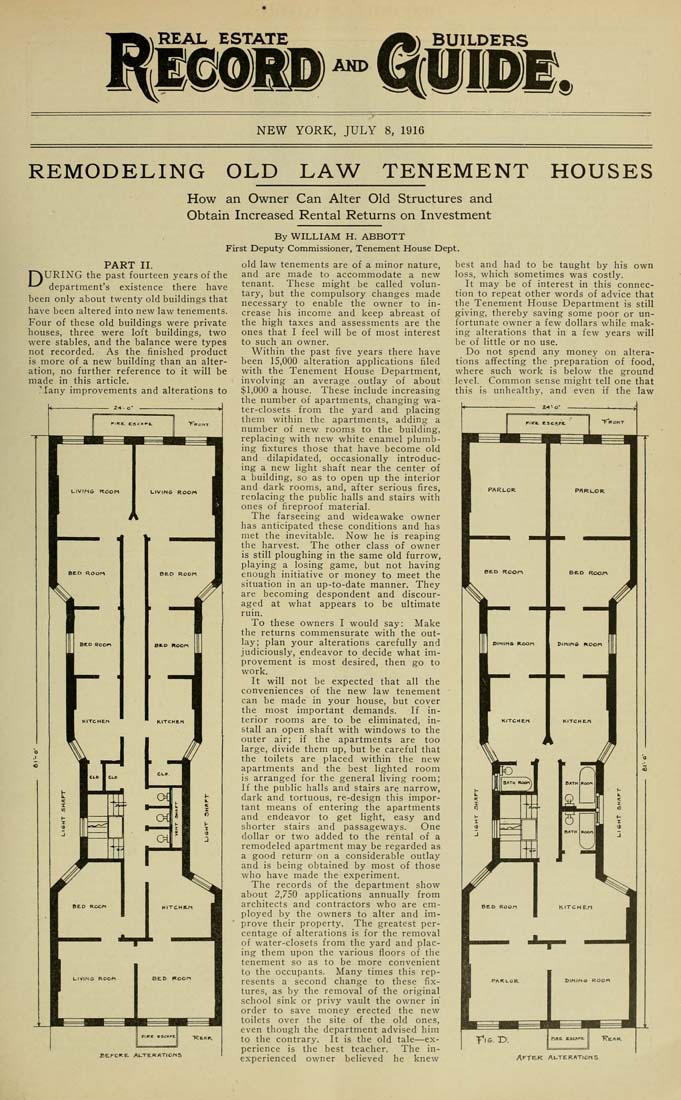Columbia University Libraries Digital Collections: The Real Estate Record
Use your browser's Print function to print these pages.
Real estate record and builders' guide: [v. 98, no. 2521: Articles]: July 8, 1916

Text version:
Please note: this text may be incomplete. For more information about this OCR, view About OCR text.
REAL ESTATE AND NEW YORK, JULY 8, 1916 REMODELING OLD LAW TENEMENT HOUSES How an Owner Can Alter Old Structures and Obtain Increased Rental Returns on Investment By WILLIAM H. ABBOTT First Deputy Commissioner, Tenement House Dept. PART II. POURING the past fourteen years of the "-^ department's existence there have been only about twenty old buildings that have been altered into new law tenements. Four of these old buildings were private houses, three were loft buildings, two were stables, and the balance were types not recorded. As the finished product is more of a new building than an alter¬ ation, no further reference to it will be made in this article, I'lany improvements and alterations to BEf^CiCE- AUXERrtTlOf^S old law tenements are of a minor nature, and are made to accommodate a new tenant. These might be called volun¬ tary, but the compulsory changes made necessary to enable the owner to in¬ crease his income and keep abreast of the high taxes and assessments are the ones that I feel will be of most interest to such an owner. Within the past five years there have been 15,000 alteration applications filed with the Tenement House Department, involving an average outlay of about $1,000 a house. These include increasing the number of apartments, changing wa¬ ter-closets from the yard and placing them within the apartments, adding a number of new rooms to the building, replacing with new white enamel plumb¬ ing fixtures those that have become old and dilapidated, occasionally introduc¬ ing a new light shaft near the center of a building, so as to open up the interior and dark rooms, and, after serious fires, reolacing the public halls and stairs with ones of fireproof material. The farseeing and wideawake owner has anticipated these conditions and has met tlie inevitable. Now he is reaping the harvest. The other class of owner is still ploughing in the same old furrow, playing a losing game, but not having enough initiative or money to meet the situation in an up-to-date manner. They are becoming despondent and discour¬ aged at what appears to be ultimate ruin. To these owners I would say: Make the returns commensurate with the out¬ lay; plan your alterations carefully and judiciously, endeavor to decide what im¬ provement is most desired, then go to work. It will not be expected that all the conveniences of the new law tenement can be made in your house, but cover the most important demands. If in¬ terior rooms are to be eliminated, in¬ stall an open shaft with windows to the outer air; if the apartments are too large, divide them up, but be careful that the toilets are placed within the new apartments and the best lighted room is arranged for the general living room; If the public halls and stairs are narrow, dark and tortuous, re-design this impor¬ tant means of entering the apartments and endeavor to get light, easy and shorter stairs and passageways. One dollar or two added to the rental of a remodeled apartment may be regarded as a good return- on a considerable outlay and is being obtained by most of those who have made the experiment. The records of the department show about 2,750 applications annually from architects and contractors who are cm- ployed by the owners to alter and im¬ prove their property. The greatest per¬ centage of alterations is for the removal of water-closets from the yard and plac¬ ing them upon the various floors of tlie tenement so as to be more convenient to the occupants. Many times this rep¬ resents a second change to these fix- lures, as by the reinoval of the original school sink or privy vault the owner in' order to save money erected the new toilets over the site of the old ones, even though the department advised him to the contrary. It is the old tale—ex¬ perience is the best teacher. The in¬ experienced owner believed he knew best and had to be taught by his own loss, which sometimes was costly. It may be of interest in this connec¬ tion to repeat other words of advice that the Tenement House Department is still giving, thereby saving some poor or un¬ fortunate owner a few dollars while mak¬ ing alterations that in a few years will be of little or no use. Do not spend any money on altera¬ tions affecting the preparation of food, where such work is below the ground level. Common sense might tell one that this is unhealthy, and even if the law AFTE.K AUTERATIOriS